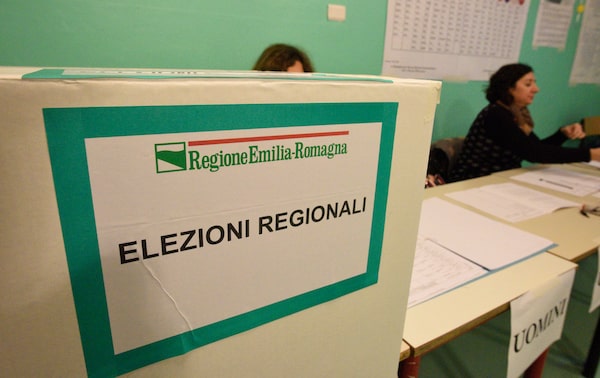
A ballots' box for Emilia Romagna region elections, at a polling station in Bologna, Italy, Jan. 26, 2020.Stefano Cavicchi/The Associated Press
Polls have closed in a hotly contested regional election where Italy’s right-wing opposition leader Matteo Salvini campaigned hard to unseat 70 years of left-wing governments with the aim of shaking the weak coalition in Rome.
Exit polls on Sunday evening by Italian state broadcaster RAI gave an edge to the centre-left candidate in the northern region of Emilia-Romagna, Stefano Bonaccini, with 47 per cent to 51 per cent of the vote. That compared with the centre-right candidate from Mr. Salvini’s League, with 44 per cent to 48 per cent of the vote. Turnout in the region was running much higher than in the last regional vote.
Analysts said a victory by Mr. Salvini’s right-wing populist League in Emilia-Romagna would prompt a crisis in Rome, where the 5-Star Movement is in a shaky coalition with the Democratic Party. The government was formed last summer after Mr. Salvini, who was vice-premier and interior minister, made a failed grab for power, collapsing the previous 5-Star-League government and losing his posts.
Mr. Salvini, who remains Italy’s most popular politician in opinion polls despite the misstep, has made clear that his aim is to destabilize the national government in Rome and take power nationally.
Italian Premier Giuseppe Conte has said that his government is determined to complete its mandate until 2023, no matter the outcome of Sunday’s vote.
The Democratic Party incumbent, Mr. Bonaccini, found himself in the role of underdog in Emilia-Romagna despite a strong local economy and a favourable job rating. He ran against a little-known League politician, Lucia Borgonzoni, who lost the 2016 Bologna mayoral race.
A victory for Mr. Salvini in the region that has been a left-wing stronghold since the Second World War would be a blow to the Democratic Party, which has been weakened by divisions in its own ranks. A vote was also being held in the southern region of Calabria, which Mr. Salvini briefly represented as a senator, part of his bid to reform the once-secessionist Northern League into a national party.
Mr. Salvini’s push for a victory in Emilia-Romagna spawned a grassroots protest movement called the Sardines that has ballooned nationally with the aim of countering Mr. Salvini’s rhetoric, which critics say is hostile to foreigners and undermines Italian institutions. The movement was born in Bologna, the region’s capital, in November and more than 40,000 protested there a week before the election.
Our Morning Update and Evening Update newsletters are written by Globe editors, giving you a concise summary of the day’s most important headlines. Sign up today.